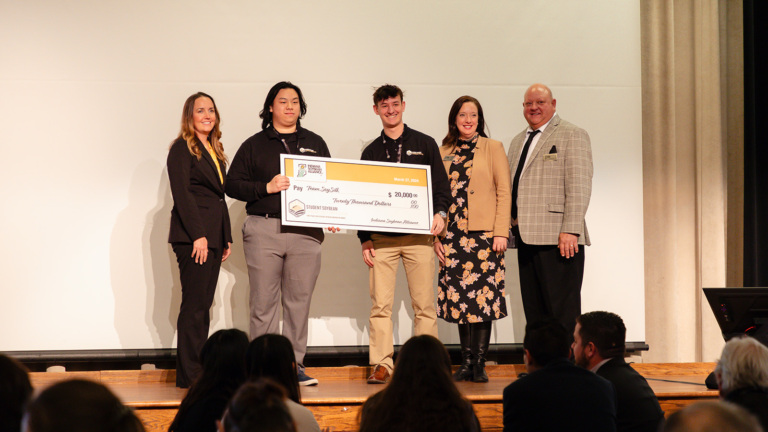A skin-sensitive baby wipe with only one non-soybean ingredient besides water earned the $20,000 grand prize in the 30th annual Student Soybean Innovation Competition, announced during an awards ceremony on Wednesday evening at the Purdue Memorial Union in West Lafayette, Ind.
Gentle on the skin like silk, SoySilk uses soybean ingredients in every step of the baby wipe production, including the base sheet and the formulation. SoySilk is a plastic-free, vegan, non-toxic, environmentally friendly, biodegradable and compostable alternative to all other baby wipes used in the United States, while still giving customers a quality product.
SoySilk was created by the duo of Purdue University junior Kyle Han from Taipei, Taiwan, and Purdue freshman Ben Gottlieb from Chappaqua, New York. Han is pursuing a bachelor’s degree in biological engineering with a concentration in cellular and biomolecular engineering in the Department of Agricultural and Biological Engineering. Gottlieb is studying finance at Purdue’s Mitchell E. Daniels, Jr. School of Business.
The Student Soybean Innovation Competition is sponsored by the Indiana Soybean Alliance (ISA) and Purdue University. To win this competition, Purdue University students must develop novel applications for soybeans that satisfy a market need.
“ISA looks forward to working with Purdue students each year and seeing what unique products they create,” said ISA Board Chair Kevin Cox, a farmer from Brazil, Ind. “The goal of this competition is to showcase the versatility of soybeans while addressing a need in agriculture or the general public. The results often expand opportunities and markets for all Indiana soybean growers. We are excited about SoySilk. This appears to be a safe and necessary product that we think will be attractive to many people.”
Baby wipes on the market today are made of pulp, plastic and chemicals such as cleaning or disinfecting agents. SoySilk uses soy fiber as the base sheet, soy protein crosslink to increase breaking tenacity, and soy glycerin and soy lecithin as emollients for the skin. No trees are cut down, and no plastic polymers are used, yet it offers the best cleaning effect to consumers. With a soy fiber base sheet, SoySilk created a baby wipe that is 143 percent thicker than the average baby wipes on the market.
“Our product’s mission is to provide a top-tier customer experience in baby wipes while creating positive environmental effects,” Gottlieb said. “Most importantly, SoySilk will pave a new path for wet wipe materials as countries pass new regulations to prohibit the plastic polymers contained in current baby wipes.”
According to Persistence Market Research, the global baby wipes market will reach $9.9 billion by 2032. SoySilk contains 92 percent soy content on a dry weight, which can utilize $313 million worth of soy protein through U.S. sales alone. Gottlieb added, “Our product introduces an innovative business opportunity in a high-value market with an enormous volume of soy for our high-quality Indiana soybean industry to profit and create a positive impact on our planet.”
The United Kingdom’s Department for Environment, Food & Rural Affairs (DEFRA) published a report on April 4, 2023 calling for a ban on baby wipes – or wet wipes – containing plastic. A similar report listed wet wipes as a commonly littered, single-use plastic items in England. A U.K. survey showed 96 percent of respondents supported a ban on wet wipes containing plastic.
“Global consumer-goods manufacturing companies like Proctor & Gamble and Kimberly-Clark have been trying to develop a new material for their Pampers and Huggies baby wipes pipeline without plastic polymers but still strong,” Han explained. “Many companies believe that with the sustainability trend, the European Union and the United States will soon catch up on banning wet wipes that contain plastic. Our team is providing a new alternative with SoySilk baby wipes to tackle the ban and influence the business for the U.S. market.”
This year, 15 teams composed of 48 Purdue University students and 19 faculty advisors, finished the competition. These students represent a variety of majors including agronomy, biological engineering, animal science, pharmacy and environmental and natural resource engineering. Each team works with two faculty advisors who provide technical and market research support.
Read the full story here.

